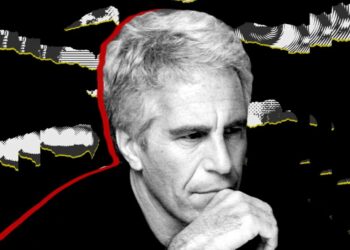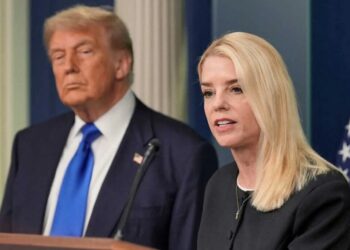For evidence of China’s prominence at the United Nations climate summit in Brazil, look no further than the convention hall, where China boasts one of the largest pavilions, prominently located in the center next to the host country.
Before a fire tore through part of the Pavilion Hall on Thursday, throngs converged daily at China’s exhibition area to pick up panda-themed tote bags, listen to energy experts and admire displays of China’s global investments in clean energy: a solar farm in the Gobi Desert, battery storage in Saudi Arabia, transmission lines in Egypt and Brazil.
China is on its way to becoming the first electrostate, leading the world in electricity generated by wind and solar power and selling that technology, along with electric vehicles, to much of the world.
But behind closed doors in the negotiating rooms at the U.N. summit, where nations are wrestling with how to move away from fossil fuels, China has been mostly quiet.
It is not stepping into the vacuum that was created when the Trump administration decided to pull the United States from the climate talks for the first time in 30 years. It has avoided strong positions on the need to prevent the planet from dangerously warming. It is not promising to more aggressively reduce the greenhouse gases it generates, nor is it pushing other nations to do so. And it has declined to offer more money to help poor countries cope climate change or to invest in effort to save tropical forests.
As the world gathering headed into its final stretch, analysts said China was showing little interest in taking up the mantle of global climate leader.
“It is frustrating,” said Natalie Unterstell, the president of Talanoa, a Brazilian climate research organization. “We would like to see a high-ambition China.”
One reason appears to be self-interest.
The United Nations climate body classifies China as a developing country, even though it is the world’s second-largest economy. The Chinese have strongly resisted any change to that status, which would allow it to be grouped with rich, industrialized nations. That would put more pressure on China to enact deeper cuts in its greenhouse gas emissions or provide financial help to poorer countries struggling with climate disruption.
In the real world, the Chinese have provided billions of dollars in loans and grants to poorer countries to help them deal with climate change and to transition to renewable energy. But its delegation at Belém objects to any language that might result in the United Nations requiring, or even asking, it to provide such aid.
When it comes to the most contentious issue in Belém, whether nations will enact a so-called road map for transitioning away from fossil fuels, China has been quiet, diplomats said.
Even though China is currently the planet’s biggest polluter, it “has a strongly-held view that climate change is a problem caused by developed countries, and that they should lead the way,” said Kaveh Guilanpour, a vice president at the Center for Climate and Energy Solutions, a nonprofit group that is following the negotiations in Belém.
China’s own plan to reduce its greenhouse gas emissions has been criticized as insufficient. The European Union climate commissioner, Wopke Hoekstra, called it “disappointing,” and former Biden administration officials in Belém said it did not do nearly enough to limit dangerous warming.
Representatives of the Chinese delegation did not respond to interview requests.
At the same time, China has enjoyed positive publicity merely by continuing to participate in the U.N. climate negotiations. It has also presented itself as stable partner in global discussions. The Chinese state-owned newspaper Global Times declared that the country had “become the defender of international cooperation on climate change.”
Its leaders have chided both the United States, where the Trump administration is doing nothing to tackle climate change, as well as the Europeans, who are struggling to meet their promises to reduce the carbon dioxide emissions that are dangerously heating the planet.
“China is a country that honors its commitments,” Ding Xuexiang, China’s vice premier, said pointedly ahead of the formal deliberations.
Senator Sheldon Whitehouse, a Rhode Island Democrat who is the U.S. federal official to the talks in Belém, said China’s prominence at COP30 underscored how much the Trump administration is ceding the clean energy economy to Beijing.
“They are clearly relishing being the primary economy and country present in our absence,” he said.
Environmental groups here have heaped praise on China and noted that the United States is the country that has added the most carbon dioxide to the atmosphere since the Industrial Revolution and that, under the Trump administration, it is withdrawing from the 2015 Paris accord, the global agreement to fight climate change. At the same time, they point out, United States is increasing its use of fossil fuels.
“The largest historic polluter has exited the Paris Agreement,” said Avantika Goswami, who leads the climate program at the Centre for Science and Environment, a research group based in New Delhi. “We are seeing China be a leader.”
China’s top issue in Belém has less to do with leading other nations and more with its own economic interests.
Specifically, China wants to eliminate European and other tariffs it sees as a barrier to selling its solar panels, electric vehicles and other exports to global markets. And, it has argued here that if countries are serious about more quickly bringing down emissions, they should make it easier for China to sell its green products.
“From a soft power perspective I don’t believe China has been ready to play a larger role or even to replace the vacuum left by the U.S.,” said Zou Ji, president of Energy Foundation China, an organization that works with the Chinese government on climate change issues, and a former member of China’s climate negotiating team.
Instead, he said, it is leading by selling solar panels, EVs and batteries cheaper and more accessible for the rest of the world.
“China’s rise as a global economic and industrial power is unfolding far more rapidly than the pace of U.N. politics,” said Li Shuo, director of the China Climate Hub at the Asia Society Policy Institute.
Lisa Friedman is a Times reporter who writes about how governments are addressing climate change and the effects of those policies on communities.
The post China Offers Panda Totes, but No New Commitments, at Climate Talks appeared first on New York Times.




